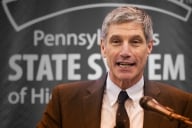You have /5 articles left.
Sign up for a free account or log in.
Merrick B. Garland, President Obama's nominee to the U.S. Supreme Court, could well have a major impact on legal issues important to colleges, their students and their employees. But as a judge on a federal appeals court, Garland has not written major opinions on higher education law. He has, however, played a role in several decisions of importance to academe. Just last week, he was on a three-judge panel of the U.S. Court of Appeals for the District of Columbia that rejected a challenge by for-profit colleges of the U.S. Department of Education’s gainful employment rule. The decision was issued unanimously and without identifying any single judge as author. In 2004, he was a member of another three-judge panel that ordered the National Labor Relations Board to reconsider a decision by one of its regional offices that faculty members at LeMoyne-Owen, a private institution, had the right to engage in collective bargaining.
Garland has been involved in the law school of Harvard University, where he earned his law degree, by giving periodic lectures and judging moot court competitions.








